As the hype preceding the release of Richard Linklater’s latest narrative experiment, Boyhood, ramps up, let’s take a look back at Linklater’s equally structurally inventive project, the Before trilogy.
Before Sunrise, Before Sunset and Before Midnight form a triptych-like portrait of a couple at various points in their relationship. Having introduced the American Jesse (Ethan Hawke) and French Celine (Julie Delpy) as they first met aboard a train in Before Sunrise (1995), writer-director Linklater revisited them at 9 year intervals in Before Sunset (2004) and again in Before Midnight (2013).
From its opening minutes Before Sunrise establishes the fly-on-the-wall form of realism audiences will receive throughout the trilogy. As a German couple argue loudly on the Vienna-bound train it feels like something you’d surreptitiously watch and/or eavesdrop on in real life, not see projected on to a movie screen. This well-observed yet mundane moment is the catalyst for Jesse and Celine’s meeting; Celine moves seats to avoid the escalating row and ends up near Jesse who quickly strikes up a conversation. In such early discussions Hawke’s Jesse comes across as confident and even flirtatious, yet later in Before Sunrise he is endearingly nervous about kissing Celine.
While Jesse is a tourist interailing across Europe in the wake of being dumped by a girlfriend he’d flown out to visit in Madrid, Celine is a native Parisien returning from a visit to her Grandmother in Budapest. The initially confident and charming Jesse convinces Celine to get off the train with him in Vienna, where he must spend the night before flying back to the US.
From here on the film is largely an extended walk-and-talk punctuated with incidents such as a visit to Vienna’s Wiener Riesenrad and a set piece in which a homeless man writes Jesse and Celine a personalised poem in return for some cash.
Realism continues to convince in the aesthetic details of costume and hair; like any backpacker, Jesse’s clothes are wrinkled and his hair seems to become greasier as the night continues. Of course, when the trilogy is considered as a whole, the natural aging of Hawke and Delpy contributes to the realism.
As 2004’s follow-up Before Sunset draws to a close the camera lingers over the details of Celine’s impeccably realised archetypally-arty Parisien apartment. Although Little White Lies journalist Peter Labuza recognises that Linklater’s ‘inquisitive, tourist-eye-view of cities and landscapes leads him to naturally avoid the clichés’ he overstates the importance of location in the Before trilogy, claiming that tourism is its ‘central concern’. But these films often shy away from the conventional tourist sights. For instance, Before Sunset doesn’t contain a single shot of the Eiffel tower, and in Before Sunrise Jesse and Celine spend as much time wandering non-descript alleyways and drinking in bars filled with locals as they do riding the Wiener Riesenrad.
Before Sunrise’s walk-and-talk formula, also a much-referenced characteristic of Aaron Sorkin’s TV drama The West Wing, is utilised again in Linklater’s following instalments. These are faster paced, perhaps as the characters, in their 30s and then 40s, are more confident in their own skin.
On the latter two films Hawke and Delpy also joined Linklater and his collaborator Kim Krizan as writing credits, suggesting that as the trilogy progressed there was a larger component of improvisation, which may have enabled the less meandering pace these films have when compared to Before Sunrise. However, in both Before Sunrise and Before Sunset there are clunky moments in which Hawke and Delpy’s quick exchanges appear too obviously to be scripted performance; the often philosophically contemplative nature of their utterances fails to convince as on-the-spot thought. In each of the three films though, there are also moments where Linklater and his collaborators use Celine and Jesse to hit on insightful truths about life. In Before Sunset, for example, Celine tells Jesse about her experiences of working for environmental agency Green Cross:
“I see the people that do the real work and what’s really sad in a way is that the people that are the most giving, hardworking and capable of making this world better usually don’t have the ego and ambition to be a leader. They don’t see any interest in superficial rewards…they actually enjoy the process of helping others”.
As well as presenting a recognisable vision of the world Linklater humorously uses the dialogue of his films in a self-reflexive manner to comment on the form of the trilogy itself. In Before Sunset Jesse and Celine’s reunion occurs as Celine attends a reading Jesse gives at the famous Paris bookshop Shakespeare and Company. It quickly becomes obvious that Jesse’s novel, This Time, is inspired by his first encounter with Celine in Vienna, that dramatised in Before Sunrise. By Before Midnight, in which Jesse and Celine are holidaying in Greece with their daughters, Jesse is a fully-fledged writer working on his fourth novel. In a discussion with friends Stefanos (Panos Koronis) and elderly writer Patrick (Walter Lassaly), Jesse must clear up Stefanos’ confusion over the chronology of his similarly titled first two books, This Time and its sequel, That Time. This in-joke elegantly acknowledges the likely possibility of audiences mixing up Linklater’s first two Before films due to the extreme similarity of their titles.
The trilogy abounds with recurring themes, one of the most interesting being Celine and Jesse’s various discussions about the differences between men and women which ranges from dry tongue-in-cheek comedy to heated debate. Although Celine’s commentary on the plight of modern woman balancing motherhood, domestic duty and a career while men (read: Jesse) simply follow their own dreams may seem stale in 2013’s Before Midnight, its inclusion is true to Celine’s character in the preceding films, when such social commentary had yet to become a cliché.
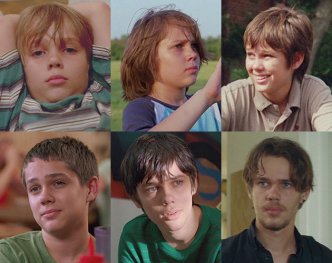 In some ways the almost real-time structure of the Before films is the exact opposite of Linklater’s conceit for Boyhood, in which 12 story years pass within the film’s runtime of 166 minutes. However, as a trilogy Before Sunrise, Before Sunset and Before Midnight span a lengthy period of time like Boyhood does as a single film.
In some ways the almost real-time structure of the Before films is the exact opposite of Linklater’s conceit for Boyhood, in which 12 story years pass within the film’s runtime of 166 minutes. However, as a trilogy Before Sunrise, Before Sunset and Before Midnight span a lengthy period of time like Boyhood does as a single film.
What’s both clever and surprising about the Before trilogy is that Linklater’s penchant for long takes convinces the viewer that this is real-time; that we are seeing everything Jesse and Celine do in their night in Vienna, for example. It is only in Before Sunset, as Celine leads Jesse through Paris’ Luxembourg gardens, that we learn through their reminiscing that they slept together in Vienna.
The trilogy also surprises through the different kinds of endings that the films adopt. The set up of Before Sunrise renders Jesse and Celine’s goodbye inevitable as viewers know all along that Jesse must catch a flight when morning comes. As he concludes his book tour in Before Sunset, the narrative could have paralleled that of the previous film, concluding with Jesse rushing to make another flight. But his reluctance to do just this is increasingly apparent throughout the film, and the resulting almost-cliffhanger ending must have been nigh on unbearable for those that had to wait 9 years for Before Midnight.
Before Midnight is at first strikingly different from its two predecessors. In the holidaymakers befriended by Jesse and Celine there are a much larger number of developed characters. The film’s opening defers the appearance of Celine as it shows Jesse saying goodbye to Hank (Seamus Davey-Fitzpatrick), his son with his estranged ex-wife, at the airport, before he joins the rest of his family in the car outside. On the drive back from the airport Celine and Jesse’s easy banter and the seeming perfection of their family life with adorable twin girls feels too good to be true. As usual, Linklater is committed to realism in showing that it is; there’s no easy payoff to the brief encounters of Before Sunrise and Before Sunset in giving Celine and Jesse a perfect family life. The disagreements and issues dramatised in the hotel room (intended as a gift from friends providing the opportunity for a romantic night alone) are utterly convincing. In its latter half Before Midnight plays like Blue Valentine without the melodrama, and with far more hope. Still, the ending is far from conclusive and Linklater has recently suggested that he might consider returning to Jesse and Celine to make another Before film. Roll on 2022.
Tonight I’m off to see a preview of Boyhood, so watch this space for my review.

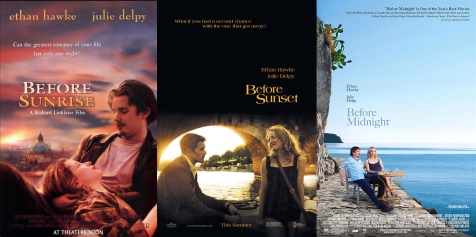
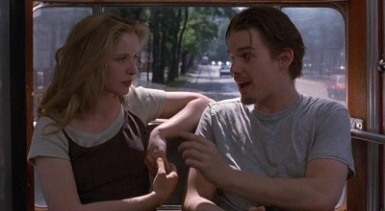
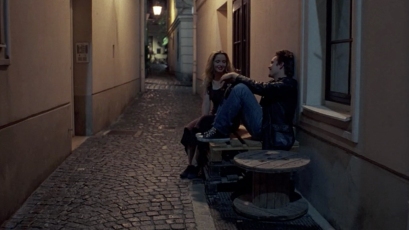
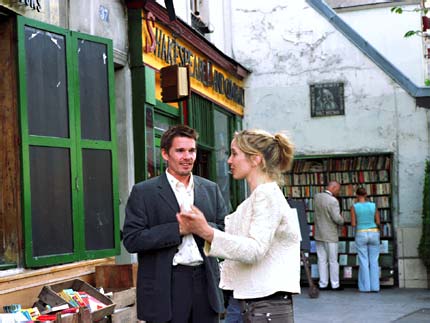
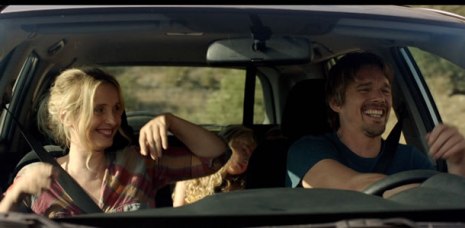
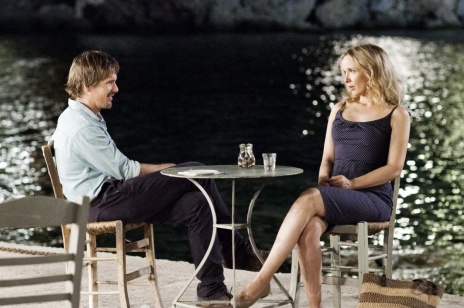
Pingback: Gün Işığı Etrafında İki Hayat | GazeteBilkent